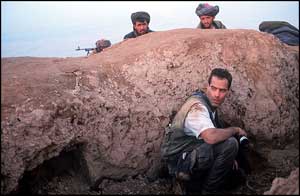 Before our politicians could properly warn us of how Nepal was turning into another Afghanistan, Bosnia or Cambodia, we find ourselves learning the ABCs of life in the post-modern world. Britain is scheduled to host an international meeting next month on ways of helping Nepal meet its security and development requirements. It's unclear where we stand in the classification of strained-fragile-failing-failed states. But the fact that an international meeting is being convened suggests we are on dangerous ground.
Before our politicians could properly warn us of how Nepal was turning into another Afghanistan, Bosnia or Cambodia, we find ourselves learning the ABCs of life in the post-modern world. Britain is scheduled to host an international meeting next month on ways of helping Nepal meet its security and development requirements. It's unclear where we stand in the classification of strained-fragile-failing-failed states. But the fact that an international meeting is being convened suggests we are on dangerous ground. How a people internationally acclaimed for their fierce fighting skills could have avoided violence at home for so long always baffled many. It's still hard, though, to accept that the commanders of the global war on terrorism see us as a potential haven for hate mongers from both hemispheres. With Nepal's modern political history smouldering in the wreckage of misplaced hopes and broken promises, distance probably allows a more dispassionate probe.
Although we emerged as a unified entity a full 120 years after the 1648 Treaty of Westphalia gave birth to the modern state, our oneness was predicated on a covenant similar to that of the Europeans. In return for freedom from fear, from want, from internal and external conflict, and greater liberty in our personal lives, Nepalis agreed to follow the decrees of the state. Our part of the deal also required us to pledge our time, energy, resources, and even lives to the service of the nation. Over the centuries, we saw many states fail because they couldn't prevent external aggression and subjugation. We dodged that historical trend only to face the malaise within.
For a country that owed its political awakening to two world wars and a civil disobedience campaign that demolished the South Asian edifice of the British Empire, Nepal's ambivalence on the road to modernisation was perhaps natural. From malaria eradication to market liberalisation, our Cold War trajectory was a little slipshod but nonetheless stirring. Multiparty politics took a backseat, but, then, we weren't the exception in the grand assembly of nations that refused to officially take sides in the superpower rivalry. Instead, we drew up a new compact under which the state offered us assurances of often petrifying predictability in exchange for enforced silence. Amid a perpetual struggle to establish its legitimacy, the partyless state set targets that sounded too good to be true. In the claustrophobic conditions of those decades, discontent fed on itself.
A population that felt doubly duped easily succumbed to the euphoria that comes with getting too much of something too soon. Freed from the state's subjugation in 1990, we believed the fusion of liberalism and capitalism would make conflict irrational and, by logical extension, irrelevant. The new leadership, trained in the rigorous circumstances of exile, incarceration and subterraneous existence, recognised the political perils of playing down public expectations so soon. Instead, they came up with another covenant. The price of tomorrow's prosperity was today's patience. It was difficult for a people seeking a better life to focus exclusively on creating a new constitution and holding new elections, but they endured. Twelve years later, the people are stuck with the same set of complaints. The political leadership, for its part, has started apologising for its lack of vision. In a culture that has always exalted authority, this is no mean achievement.
Since 11 September, 2001, those who oversaw the emergence of a new world disorder have had ample time to compare notes. In George W Bush's war on terrorism, countries like Nepal find themselves caught in Al Gore's axis of evil: poverty and ignorance; disease and environmental disorder; corruption and political oppression. Foreign aid has regained respectability on the international agenda. But since it is an investment in a secure future, the rules of philanthropy don't apply. Countries that promote open markets, respect human and political rights, and aggressively combat corruption can qualify for more international help.
Nepal could easily have been on the mind of Robert Cooper, the foreign policy guru of British Prime Minister Tony Blair, when he made his case for a "new imperialism". While poverty doesn't cause terrorism, it can lead to hopelessness and despair in states where governments fail to fulfil the basic needs of the people. These nations become havens for terror. When the terrain is treacherous, every cave and crevasse is a potential refuge for radicalism. If they become too dangerous for established states to tolerate, Cooper argues, it is possible to imagine a defensive imperialism that aims to bring order and organisation but which rests today on the voluntary principle. A new era has produced a new compact, complete with a new set of apprehensions.


